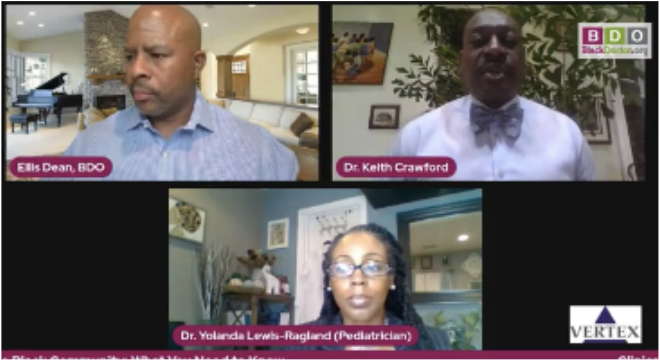
BDO- Ellis Dean:
Tonight we’re going to be talking about a solution to getting better medications, to getting better treatments for our community tonight,so we’re talking about clinical trials. I know that those are some words that have been buzzing around lately, especially with COVID and how the development of the COVID 19 vaccine and what really are clinical trials and how important are they in the development of better medications, better treatments for any type of element. Dr. Crawford, what is a clinical trial?
Dr. Keith Crawford:
Clinical trials are research that involve human participants. They involve intervention that could be a medication or a treatment. It could be a surgery surgical procedure, or it could be a medical device. It could also be a consultation with a pharmacist. It also is for accessing services from a social worker. We want to see how effective this intervention is for a disease or disease management. So we want to compare different interventions and we either compare it with whatever the standard of care is. Or if there is no standard of care, we may compare it with a placebo. We’ve all heard of that. And so if there’s a comparison, we say, this is a controlled trial. If the other intervention happens to be a placebo, which is essentially not an intervention, we say it’s a placebo controlled trial. Okay. Now, how do we determine which group you get in? How do you get into the treatment, the active treatment or the placebo group, or the alternative treatment? How do we determine the best way to do it is through what we call a randomization. That means you are randomly assigned to a group. That means you are just as likely to receive one treatment as you are the other treatment. And that’s very important because if I’m a doctor I don’t want to pick all the healthiest people and put them in the treatment group and then put all the sicker people in the placebo group, no, it needs to be randomized.
BDO- Ellis Dean:
Help us understand how clinical trials and why clinical trials are safe.
Dr. Yolanda Lewis-Ragland:
So, first of all, I love to start by telling people that medicine is as much an art as it is a science. And when we graduate, when we get that bio, that, that BA that degree in science is actually arts and sciences. So we are still learning things at time and we have to do trial and error, even when I decide to give a particular prescription for say something, um, it, all, everything that works, doesn’t always work on all people all the time, right? There’s a reason we do acidic acetaminophen, as well as ibuprofen. Some people respond better to one than the other. It’s the way medicine is practiced. It’s safer than it sounds,before we start anything that we’re going to do on a healthy population we have review boards, we have very stringent, precautions, you have to report pretty much every single thing that happens. It’s just like with this vaccine, we’ve been talking about, um, there’s the, the vaccine, um, adverse reaction reporting system. We always report anything that happens. Review boards, look at everything that we’re doing. We have to say, if this population has been consented, and as you know, as Dr. Crawford just spoke about, you sometimes have to consent to be a part of it, but agree, not to know whether you’re getting the placebo or the treatment, but prior to.
BDO- Ellis Dean:
How can one be informed of a trial? So I want you to kind of help people while it’s a trial, trying to learn more about a treatment or an intervention. And then the second thing is I want you to expand on what Dr. Ragland was talking about in terms of why is it important for people to be involved in these clinical trials?
Dr. Keith Crawford:
How are you informed? Um, if it’s a trial, it’s a trial because we don’t know what the outcome is.
The Dr. Raglin study is excellent. She understands how transcendental meditation works. She wants to determine, can this help lower blood pressure, for example, um, she thinks that it can do that based on what she knows transcendental meditation can do, but there’s no guarantee that it’s going to work. So we don’t know what the outcome is. And that’s why we have to do the trial. What the informed consent will tell you, say, for example, we give you a medication. Um, there could be a medication that we use to treat rheumatoid arthritis that we think will reduce seizures. So what’s the informed consent gonna do. It’s gonna tell you what this drug does.
Why is it important for black people to participate in clinical trials? Dr. Keith Crawford: (23:25)
So there are a couple of reasons why, um, one at the top of the list is that there are differences between racial groups and how diseases progress in manifests. We call this pathogenesis of disease. So there are differences and how the disease kind of plays out in different groups of people. This makes it important for people of color to participate in trials.
For more information on clinical trials and the way people of color can participate or how they are affected click the link.
https://www.facebook.com/BlackDoctor.org/videos/638738180872048









